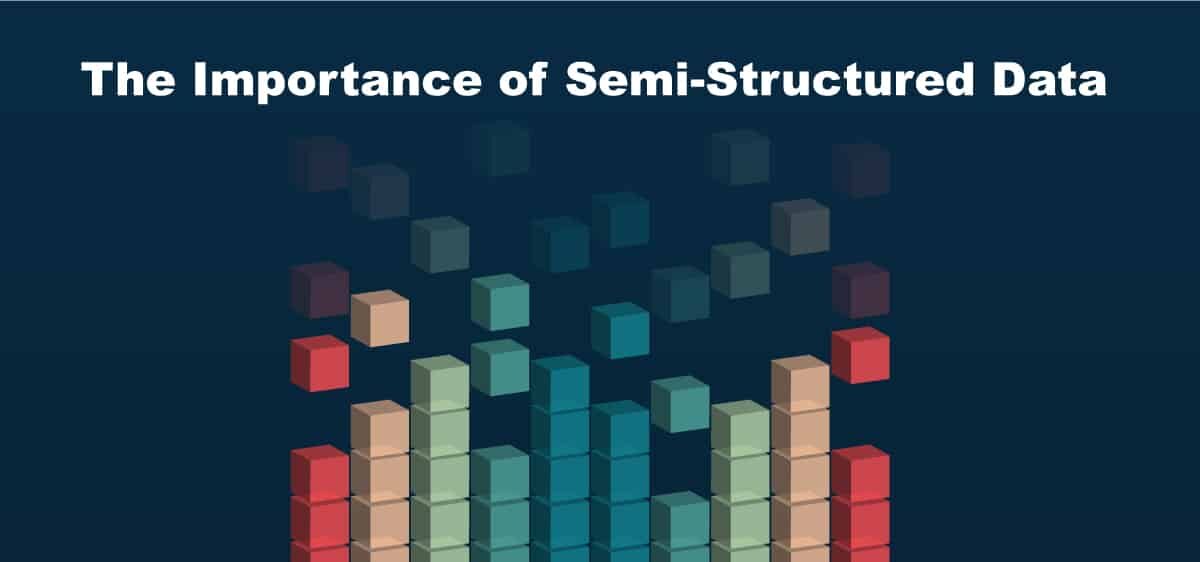Semi-Structured Data: What it is and Why it Matters
Actian Corporation
August 15, 2021

Semi-structured data is emerging as a critical element of business operations and strategies. Typically, business leaders make decisions based on analysis of data stored in forms, spreadsheets, and relational databases – in other words, structured data. However, in a modern business environment, constraining data with forms and tables is no longer sufficient.
What is Semi-Structured Data?
While structured data is the most common type of business data to be analyzed, it is not the most common type of information. Structured data represents only 5% to 10% of the information that modern businesses need to deal with regularly.
Most of the data that most businesses deal with is unstructured data, predominantly text and images. The many documents, email messages, photos, and social media posts we generate are all examples of unstructured data.
If you consider structured data as one end of a continuum and unstructured data as the other end, everything in between is semi-structured data. The amount of this type of data is growing, driven by new tools such as machine learning (ML) and new data formats such as JavaScript Open Notation (JSON).
Why Semi-Structured Data Matters
Much of the data that we once considered unstructured is better treated as semi-structured data. Unlike unstructured data, which is difficult to mine for business value, semi-structured data is easier to collate, query, and analyze. Semi-structured data, supported by a custom data model, can better support sound business decision-making and generate greater business value than unstructured data.
Many businesses are evolving from a focus on specific products or customers to a recognition that they are parts of one or more networks of products and services. This change in focus is driving a need for business intelligence beyond what can be derived from internal data sources. The outputs from external data sources that explore the marketplace and a business’s position within that marketplace are often in the form of semi-structured data. Analyzing semi-structured data tends is essential if a business is to transition from analyzing what was to gaining insight and foresight about what needs to be.
Analysis of semi-structured data can also provide significant input to business process management. Business processes are often constrained by limitations imposed by data collection and analysis. When combined with semi-structured data and goal-driven behavior, the business processes can be more easily adapted to markets and even market segments, and more responsive to customer needs and conditions. The more a business can access and analyze semi-structured data, the more that business can refine its processes.
The improved insights gained from the analysis of new data sources like semi-structured data help business leaders to develop more efficient operations and improve the chance of success of strategic initiatives. These advantages can lead to new competitive advantages.
Data Storage Considerations
Multiple factors are driving the need for additional data storage and processing. In the Business-to-Consumer (B2C) world, there is an ever-increasing use of digital devices to connect to a business. This means more direct data to collect, store, and analyze, as well as increased opportunities to collect secondary data. Feedback forms, surveys and similar tools generate additional focused information. All this data tends to be semi-structured.
Most structured data can be stored, managed and analyzed with a relational database management system (RDBMS). For simple, one-table data, a spreadsheet can suffice. Regardless of your chosen management tool, you must be able to create data models that conform to that tool’s table format. As business data grows in volume and variety of forms, it becomes increasingly difficult to fit all data into a structured, relational mold.
Learn More About Semi-structured Data
A hybrid cloud data warehouse such as Actian makes it easy to work with semi-structured data by natively ingesting JSON data and supporting it within a relational database.
Subscribe to the Actian Blog
Subscribe to Actian’s blog to get data insights delivered right to you.
- Stay in the know – Get the latest in data analytics pushed directly to your inbox
- Never miss a post – You’ll receive automatic email updates to let you know when new posts are live
- It’s all up to you – Change your delivery preferences to suit your needs